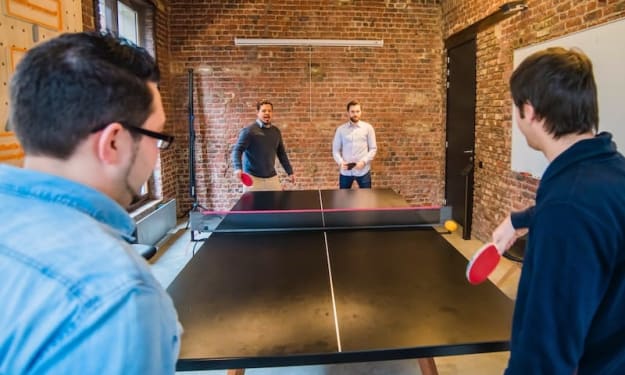BENEFIT EMOTIONAL INTELLIGENCE IN TABLE TENNIS
1. Recognizing your own feelings and 2. Reacting intelligently to these feelings.

When it comes to table tennis and psychology, emotional intelligence is an important topic. Emotional intelligence is a term that is not only gaining more and more importance in table tennis. There are now countless books about this. At this point the topic is only touched on or the most important aspect of emotional intelligence is explained. Emotional intelligence means: 1. Recognizing your own feelings and 2. Reacting intelligently to these feelings. That's the whole secret. There are many feelings. In table tennis, however, we are particularly familiar with the negative feelings of anger, anger and helplessness, as well as the positive feeling of joy. Positive feelings usually don't cause problems. On the other hand, feelings that are experienced as negative can also have negative effects.
RECOGNIZE YOUR OWN NEGATIVE FEELINGS
Important In order to be able to act emotionally intelligently, we have to be at the moment of the Outburst Recognizing your own feelings may be new to one or the other. Those who do not recognize feelings may live them out without considering the consequences. These consequences can be very different. Your own table tennis game can become more error because you are about something and thereby distracted. Up to the disqualification at the tournament, because the racket is slapped against the wall in anger or any other step can be taken by the player. Anyone who has lived out negative feelings so far will first have to learn to recognize the emerging feelings in advance. Feelings have to be recognized even before they become a sure-fire success and rational thinking is switched off. To learn this, control of mind is necessary. Attention is drawn to yourself. At first it is quite difficult for some people to consciously recognize this: "I am angry!" or "I'm angry." It's a long process that can take a year. Usually, outbursts of anger and anger develop slowly. There are different signs of feelings emerging. These can be of a physical nature, such as blushing, trembling, increased sweating, increased error rate when serving or in the game, as well as recurring thoughts.
At this point I would like to say sorry for one or two of the examples above. But there's no point in stumbling around on very sensitive topics. In table tennis there are emotions and thoughts that are really violent. Hats off to those who haven't even experienced at least one of the above thoughts. In table tennis, more people die on the table from excitement and anger than from exercise or physical exertion. It is all the more important to bring control into one's own emotional world, provided that problems in this area are either recognized or made aware of them by the trainer or supervisor. The signs that signal the appearance of negative feelings vary from person to person. It is up to everyone to recognize the physical or mental signs that are personal to them. This means that the most important step in the field of emotional intelligence has already been reached. Tip: Learn to observe yourself. Learn to recognize emerging feelings such as anger, anger or discouragement in advance.
BRING NEGATIVE FEELINGS UNDER CONTROL
To act intelligently means to act in a goal-oriented manner. An outburst of anger cannot be the goal, that's for sure. Usually the goal will be to win a match. It is obvious that any anger during the game is counterproductive. Anger and anger are distracting, reduce your own concentration and increase the error rate. It is important to know your goal, to manifest it, and not just “play along” and see what comes. Although: Anyone who lives out the idea of “just see what's coming” and does not tend to deteriorate in the quality of their game due to negative feelings has a very healthy attitude. So the psyche doesn't cause any problems. For everyone else, ask yourself the following: Use it for me and my goal if I.
No no no. It's all of no use. The goals to be pursued could therefore be.
Win match <
Don't let anything disturb me >
Maintain concentration or regain concentration after negative emotional attacks
So it is important to know for yourself what is counter productive. When that is recognized, self-recognition occurs: “I am angry, but I am now making the most sensible things out of the situation. I have an influence on the situation. " Anyone who realizes this can count on small miracles, it is an “aha experience”. And later you can proudly pat yourself on the shoulder and say, "You did well." Regardless of whether the match was won or lost. Self-control is a huge step in the right direction. If that's not enough to prevent anger from arising in the first place, you can think through the following sentence very carefully.
That is almost unfortunate. Of all people, whoever makes you white determines how I feel? Someone I hate affects my mood. I feel bad because someone I don't like might even want me to feel bad?





Comments
There are no comments for this story
Be the first to respond and start the conversation.